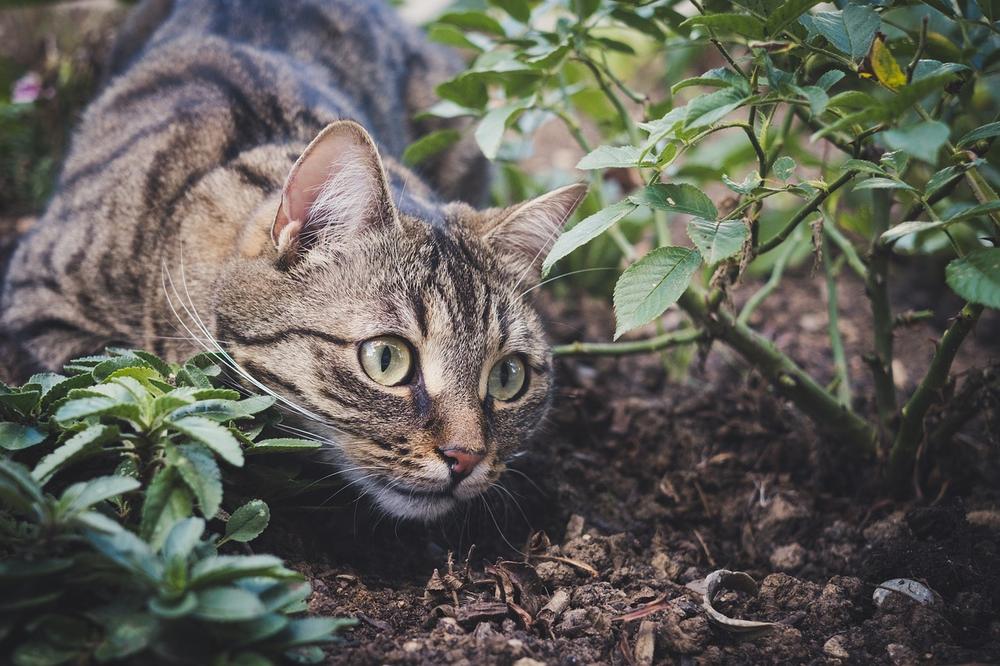Urinary Tract Infection in Cats

Ever lie awake at night, anxiety punching you in the gut, visions of your precious furball suffering the worst case scenario?
I get it, cat parent.
Urinary tract infections in cats can be terrifying.
You're desperate for answers, for treatment that will soothe their pain and bring back their joyful purrs.
Well, take a deep breath, because today we're diving deep into the realm of feline UTIs.
Let's uncover the truth and put your worries to rest. 🐾
Ready?
Let's begin.
Symptoms of Urinary Tract Infections in Cats
Keep an eye out for these 12 warning signs that your cat might have a urinary tract infection:
- You'll hear more meowing than usual, which could mean they're in pain while peeing.
- They'll be peeing more frequently than usual.
- You might notice them struggling or experiencing pain when they pee.
- If they develop urinary stones, their urine will become bloody and cause discomfort while peeing.
- They'll constantly be heading to the litter box.
- They'll seem restless.
- They'll have difficulty peeing and won't produce much urine or none at all.
- They'll start avoiding the litter box altogether.
- They may vomit.
- Male cats, in particular, will be extremely tired.
- You'll see them frequently licking around their backside.
- Female cats with blood in their urine for longer than a day or two need immediate attention from a vet.
Make sure you take your female cat displaying these symptoms to the vet as soon as possible.
If left untreated, UTIs can lead to serious kidney infections and even spread throughout their body.
Look out for these additional warning signs too:
- They'll pee only small amounts.
- They'll cry or whine during urination.
- They'll pee outside of the litter box. 😿
These symptoms could also indicate feline lower urinary tract disease (FLUTD), which affects their urinary tract.
If your cat is struggling to urinate or crying out in pain, treat it as a veterinary emergency.

Changes in their peeing habits could also point to bladder infections, while not being able to pee at all could mean a blocked bladder—which is life-threatening.
Don't waste any time—get your cat immediate medical attention.
In addition, if you notice your cat experiencing vomiting after giving birth, it's natural to feel concerned.
I want to assure you that your cat's health is paramount, and understanding the potential causes and consequences of this symptom is essential.
For more insights on this topic, I invite you to explore my blog post Cat Vomiting After Giving Birth, where you'll find helpful information to determine if this is a normal occurrence or if it requires immediate medical attention.
Let's prioritize your cat's well-being together.
Causes of Urinary Tract Infections in Cats
Urinary tract infections in cats are primarily caused by bacteria, which can enter the bladder or urethra from various sources such as the gastrointestinal or reproductive tracts. Other factors like stressful situations, changes in environment, and certain health conditions can also increase the risk of UTIs.
Urinary tract infections (UTIs) in cats can really hurt.
And I mean they're awful for your poor cat.
Not only are UTIs uncomfortable, but if left untreated, they can lead to some serious health issues.
So, it's crucial that you understand what actually causes these bothersome infections.
Well, the main culprit behind UTIs in cats is usually bacteria.
These infections can occur in either the bladder or the urethra.
Now, where does this bacteria come from?
Well, it might come from a few different places.
One common source is when bacteria from the gastrointestinal tract makes its way down into the urinary tract.
Another troublemaker is bacteria from the lower urinary or reproductive tracts, deciding to crash the party in your cat's bladder.
But wait, there's more. There are several factors that can increase your furry friend's chances of getting a UTI.
For starters, stressful situations or changes in your cat's environment, like moving homes or bringing in a new pet, can set the stage for infection.
Other things that can contribute to urinary tract issues include crystals, stones, or debris buildup, obesity, limited outdoor access, dry food diets, lack of physical activity (hey, we all get lazy sometimes!), being male, preferring an indoor litter box, emotional distress, living in multicat households, and sudden changes in routines.

Whew, that's quite a long list!
But the fun doesn't end there.
Another condition called feline idiopathic cystitis, which often occurs due to stress or dietary changes (or both), can cause problems with the bladder and urethra.
Oh, and don't forget about other health conditions like diabetes, thyroid problems, or even tumors that can mess with your cat's urinary tract. And here's something interesting:
Male cats are at a higher risk of urethral obstructions, while cats with bladder stones can be more prone to recurring UTIs.
And just when you thought it couldn't get any worse, older female cats and felines with diabetes mellitus are also at a higher risk of developing UTIs.
So, as you can see, urinary tract infections in cats aren't always simple.
There are many reasons why your cat might end up with one.
But don't worry, we're just getting started.
Next, I'll delve into the symptoms and treatment options for these pesky infections.
Stay tuned!
But now that you know what causes urinary tract infections in cats, let's delve into the essential diagnostic steps and treatment options.
Ready to become your cat's hero?
Stay tuned for some valuable information!
Diagnosing Urinary Tract Infections in Cats
When it comes to figuring out if your cat has a urinary tract infection (UTI), there are important steps you should know about:
- The vet checks your cat: They do a thorough exam and feel the belly for any signs that could mean a UTI.
- Ruling out other problems: It's important to make sure it's actually a UTI and not something else, like crystals in the pee. The vet will take their time to figure this out.
- Getting a urine sample: The vet gathers some pee by sticking a needle into your cat's bladder. This is called cystocentesis.
- Testing for bacteria: They run a special test on the pee sample to find out which specific bacteria are causing the infection. This helps them pick the right antibiotic.
- Checking the pee: A urinalysis is done to see if there are too many red or white blood cells, bacteria, or crystals in the urine.
- More lab tests might be needed: Sometimes, extra tests are necessary to identify the exact bacteria and choose the best antibiotics.
- Diagnosing Feline Lower Urinary Tract Disease (FLUTD): This requires a complete physical exam, urine analysis, X-rays, blood work, and urine culture to find out what's causing the problem.
- Don't waste time: Quick treatment matters, especially for male cats, as waiting even a little bit can lead to serious consequences.
- Recurring infections: If your cat keeps getting UTIs, more tests like urine exams, X-rays, blood work, ultrasounds, or surgery may be necessary.
You need to contact a vet as soon as you notice symptoms and provide a urine sample.

That way, you can get the right diagnosis and proper treatment. 😺
And now, let's explore the various treatment options available for urinary tract infections (UTIs) in cats...
Treating Urinary Tract Infections in Cats
Cats can get urinary tract infections too, and you have to get them to the vet right away. Here's what you can do to treat them:
- If there's a blockage in their urethra, the vet can flush it out with fluid.
- The vet might give them antibiotics to fight off the infection.
- To stop bacteria from growing, they may recommend using urine acidifiers to make the bladder more acidic.
- They might also suggest a special canned diet to prevent concentrated urine and help with recurring UTIs.
- In really stubborn cases, your cat might need to take antibiotics for a while.
- Even after treatment, it's still important to have regular check-ups to make sure everything is back to normal.
- And of course, the vet will make sure your cat isn't in pain during this whole ordeal.
- It's crucial that your cat stays hydrated, so make sure they're drinking enough water.
- Sometimes changing up their diet can help dissolve bladder stones or prevent them from coming back.
- Finally, if there are any behavioral or environmental factors contributing to the UTIs, those need to be addressed too.
With these treatments, your cat should be back to normal in about a week or so.

You'll see them enjoying good urinary health in no time.
And now, let's discuss some proactive measures you can take to maintain your cat's urinary tract health!
Preventing Urinary Tract Infections in Cats
Regular cleaning is important in preventing urinary tract infections
If you want to keep your cat free from urinary tract infections, ensure you clean their litter box regularly. By doing this, you're not only making it safer for them, but also taking care of their hygiene.
This way, they can comfortably do their business without any worry.
Cleaning the litter box is not just about hygiene though. It helps me keep an eye on my cat's urinary tract health as well.
By paying attention to how often they pee and the consistency of their urine, I can spot any potential issues early on and take necessary steps to prevent infections or other urinary tract diseases.
Get advice from a veterinarian for the best approach
Taking care of your cat's bladder health goes beyond simple litter box cleaning. To get the most accurate advice tailored specifically to your furry companion, it's always a good idea to consult with a veterinarian. They know best what would work for your cat in terms of preventing urinary tract infections.
Your vet might suggest a special diet that promotes lower urinary tract health or give you tips on how to prevent recurring infections.
Remember, every cat is unique, so what works for one may not work for another.

Fortunately, your vet will guide you in finding the right solutions for your beloved pet.
Support others when veterinary care is unaffordable
While following these preventive measures can significantly reduce the chances of urinary tract infections, unfortunately, there's no guaranteed method.
Sometimes, the cost of veterinary care for infected cats can be overwhelming.
If you have the means and want to make a difference, consider donating to emergency appeals or local animal shelters.
Your contribution could help provide crucial vet care to those who cannot afford it, ensuring that no pet goes untreated due to financial constraints.
Let's join forces to ensure all cats receive the care they deserve.
And now, let's delve into the treatment options for urinary tract infections in cats... Antibiotics may be the go-to solution for eliminating the bacteria causing the infection, but there's another key player in this battle – probiotics.
Combining these two forces can effectively treat and prevent UTIs, ensuring your cat's urinary tract remains healthy and their in essence well-being is supported.
Let me explain further...
Medications for Urinary Tract Infections in Cats
| Medications for Urinary Tract Infections in Cats | Purpose |
|---|---|
| Antibiotics | Eliminate the bacteria causing the infection |
| Probiotics | Maintain a healthy urinary tract |
| Cranberry Supplements | Support the cat's immune system and prevent future infections |
| Anti-inflammatory Medications | Reduce inflammation in the urinary tract |
| Pain Medications | Provide relief for discomfort or pain |
| Urinary Acidifiers | Acidify urine to create an unfavorable environment for bacterial growth |
| Urinary Antispasmodics | Relieve muscle spasms in the urinary tract |
| Diuretics | Increase urine production to flush out bacteria |
| Corticosteroids | Reduce inflammation and alleviate symptoms |
| Urinary Calming Supplements | Promote relaxation and reduce stress-related bladder issues |
Probiotics and antibiotics are both valuable treatments for urinary tract infections (UTIs) in cats.
No doubt, they each have their role to play.
Let me break it down for you...
When your adorable furry friend is suffering from a UTI, antibiotics are the first line of defense.
They tackle the underlying cause head-on and eliminate the bacteria responsible for the infection (goodbye unwanted intruders, hello relief).
And here's the kicker:
If your cat is experiencing pain, don't hesitate to use pain medications to provide some quick relief.
There's nothing wrong with lending them a helping paw!
But that's not where the story ends, my friends.
Equally important is the introduction of probiotics into the equation.
These friendly little organisms work wonders in maintaining a healthy balance of bacteria in your cat's urinary tract while giving a boost to their immune system.
After all, you want your feline companion to feel their absolute best, right?
By keeping the urinary tract content, robust, and flourishing, probiotics significantly reduce the likelihood of those bothersome UTIs making a comeback.
So, remember, incorporating probiotics into your furball's treatment plan is a win-win situation all around.
It's like furnishing them with a secret weapon against future infections!
But what else can you do to help your furry companion in their battle against urinary tract infections?
Well, I have some fantastic home remedies and supplements for you to explore!
You won't believe the impact these simple additions can have on your cat's urinary health.
Get ready to discover easy ways to increase moisture content, maintain a healthy pH balance, restore the bladder wall, and even promote overall well-being.
Trust me, you don't want to miss out on these secrets!
Home Remedies for Urinary Tract Infections in Cats
Boost your cat's food moisture content by adding water or low-sodium chicken broth to their canned meals.
This simple hack will enhance their fluid intake, eliminating harmful bacteria from the urinary tract.
When it comes to tackling pesky urinary tract infections in furry felines, you've got options right at home.
Consider incorporating cranberry supplements to maintain urinary tract health.
Apple cider vinegar works wonders too, lowering urine pH and creating an unwelcome environment for bacterial invaders.
Not to mention the power of glucosamine and chondroitin, aiding in bladder wall restoration.
Harness the antibacterial properties of marshmallow root while increasing urine production.
And for a hydration boost, indulge your furry friend with revitalizing bone broth.
Remember, your cat's well-being should always come first.
Managing UTIs in Cats
Key takeaways:
- Monitor changes in bathroom habits like frequent urination and pain while urinating.
- Symptoms of UTIs in cats include frequent trips to the litter box, bloody urine, and restlessness.
- Prompt veterinary treatment is necessary if symptoms are present.
- UTIs can lead to kidney infections and systemic infection if left untreated.
- Diagnosing UTIs requires a urine sample and culture-and-sensitivity test.
- Treating UTIs may involve antibiotics and special diets to prevent concentrated urine.
- Monitor litterbox habits to maintain urinary tract health.
- Antibiotics are the main treatment for UTIs in cats.
- At-home remedies include cranberry supplementation and apple cider vinegar.
- Watch for changes in bathroom habits and seek veterinary care if symptoms occur.
- Prompt treatment is necessary to prevent complications.
- Diagnosing UTIs requires a urine sample and culture test.
- Treatment includes antibiotics and special diets.
- Monitor litterbox habits and consider at-home remedies for prevention.
And that wraps up today's article.
If you wish to read more of my useful articles, I recommend you check out some of these: Can Cats Get Fleas in the Winter, How to Keep a Stray Cat Warm Outside in Winter, How Cold Can Cats Survive Outside, and Do Cats Drink Less Water in the Winter
Talk soon,
-Sarah Davis